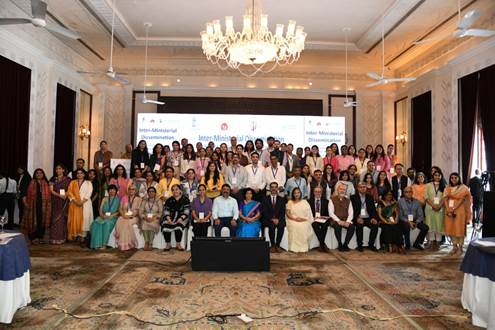The Indian government has reiterated its unwavering commitment to the well-being of adolescents at the launch of a new report titled “Economic Case for Investment in the Well-being of Adolescents in India.” The event, held on Thursday, highlighted significant improvements in adolescent welfare across the country and showcased the government’s extensive policies aimed at promoting youth health and development.
Union Health Secretary Apurva Chandra emphasized India’s dedication to nurturing adolescent talents and empowering them to build a brighter future. “India has and will continue to remain steadfast in its commitment to nurturing adolescents’ talents, supporting their ambitions and empowering them to build a brighter, inclusive future for all,” Chandra said.
Highlighting India’s unequivocal commitment to adolescents, he said, “Our government is dedicated to creating an environment where adolescents can thrive, make informed decisions, and contribute meaningfully to society.”
The report, building on global findings presented at the 77th World Health Assembly in Geneva, underscores the economic benefits of investing in adolescent well-being. It projects that an annual investment of $33 billion across various sectors could yield returns of $476 billion per annum, potentially boosting India’s GDP by an average of 10.1%.
Chandra highlighted India’s pioneering role in launching the Rashtriya Kishor Swasthya Karyakram (RKSK), a program dedicated to reaching 253 million adolescents, with a special focus on marginalized groups. He also mentioned other initiatives such as the School Health and Wellness Programme under Ayushman Bharat and the Scheme for Promotion of Menstrual Hygiene.
Prof. Bruce Rasmussen from Victoria University presented key findings, saying that increased government intervention in areas such as education, skill development, and reduction of child marriage and road accidents could lead to significant GDP growth.
Dr. Rodrigo H. Ofrin, WHO Representative to India, said that India’s achievements in various health indicators and the importance of investing in adolescents to achieve Sustainable Development Goals.
The government’s commitment is further reflected in the 2024-25 Union Budget, which allocates Rs 2 lakh crore (approximately $26.67 billion) towards education, job creation, and skill development for 41 million youth.
Representatives from various sectors, including education, health, and international organizations, attended the event, discussing the multifaceted approach needed to address adolescent well-being. The launch of the U-WIN platform, modeled after the Co-WIN platform, was also announced, which aims to digitize and monitor health records of children.
The Investment Case for Adolescent Health & Wellbeing report developed by PMNCH underscores the substantial economic benefits of investing in adolescent well-being. It highlights seven key programmes in areas such as adolescent health, education, child marriage prevention, and road safety, which are expected to yield impressive returns on investment. For every dollar invested, returns are estimated to range from USD 4.6 to USD 71.4.














